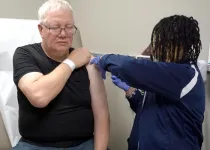(Press-News.org) COLUMBUS, Ohio – Despite the Centers for Disease Control and Prevention warning this year will be potentially dangerous for respiratory illnesses, a third of Americans are not concerned about the threat, according to a new national survey by The Ohio State University Wexner Medical Center.
The survey found that while the majority of those polled (87%) said they do everything they can to avoid spreading seasonal viruses, one-third think their vaccine decision doesn’t affect others and that they don’t need vaccines for the flu or COVID-19 if they’re not at high risk.
“Unfortunately, respiratory viruses can cause really severe and life-changing disease for some people, even among the young and very healthy. The best way to help prevent a virus from really upending your life or others is to get vaccinated. Our vaccines are safe and very effective in preventing you from getting very sick and that’s an important outcome,” said Megan Conroy, MD, a pulmonologist and critical care specialist at the Ohio State Wexner Medical Center and clinical assistant professor in the College of Medicine.
Along with the flu and respiratory syncytial virus (RSV), COVID-19 has become part of the respiratory virus season, resulting in strain on the healthcare system. The CDC projects the total number of hospitalizations will be higher this year than in seasons before the COVID-19 pandemic.
“Unfortunately, the flu kills tens of thousands of Americans every year. We get an idea of how bad a respiratory illness season the U.S. will have by looking at what happened in the southern hemisphere where flu season is during our summer. Australia had almost a record setting influenza season. That’s concerning and a sign that we may have higher flu numbers than average and certainly higher than in recent years since universal masking has gone by the wayside,” Conroy said.
Who should get a vaccination
When it comes to flu and COVID-19 vaccinations, it’s recommended everyone 6 months and older get both vaccines every season with rare exceptions. It’s safe to get both at the same time, and clinical trials are underway on whether both vaccines can be combined into a single shot, Conroy said.
For RSV, the recommendation is vaccination for adults age 60 and older and those pregnant during weeks 32 through 36 of their pregnancy from September to January, There is a new tool to help protect babies in their first RSV season – an immunization directly with an antibody to protect from RSV. This is not a vaccine but man-made protein that mimics antibodies that the body naturally makes in response to vaccines. RSV can develop into other conditions like bronchiolitis and pneumonia.
A pneumonia vaccination is recommended for adults age 65 or older, those age 5 to 64 who are at increased risk for pneumonia due to chronic heart or lung disease or weakened immune systems and children younger than 5.
“Whenever we have more virus in the community, it's likely that we'll also see more bacterial and viral pneumonia, and it can cause severe illness in people of all ages,” Conroy said. “Keeping your guard up about respiratory illnesses is important because they’re going to be here every year. There are so many things you can do to mitigate the spread of viruses. Get your vaccination, stay home if you’re sick, avoid those who are sick and wear a mask if you’re going out and not feeling well. All of these things can help prevent you from getting sick or spreading it to others.”
Two years later, 29-year-old still recovering from COVID-19
Joe James, 29, of Mansfield, Ohio, wasn’t concerned about respiratory illness season until he got COVID-19 two years ago. He hadn’t gotten the vaccine because he was young and didn’t have any pre-existing health problems. For the first few days, it felt like the flu but when he woke up on the seventh day short of breath, he knew something was terribly wrong. He drove himself to the hospital where it was discovered that his oxygen saturation level was in the mid 70s. A normal reading is between 95% and 100% and anything below that is hypoxemia, which can be fatal.
“They said ‘Who drove you here?’ I said ‘I drove myself.’ I was perplexed by the question because I didn’t know what mid 70s meant. I thought I was just a little short of breath. They said ‘You shouldn’t even be having this full on conversation right now,’” James said.
James was admitted to the intensive care unit at a local hospital and life flighted weeks later to Ohio State as his condition continued to deteriorate. He was ventilated, had a thoracotomy (a surgery opening up the chest) and at one point his oxygen saturation level dropped into the teens.
“Joe had just about the worst go of it with COVID and to come out on the other side and be alive is really amazing,” Conroy said. “It came on really suddenly for him and, unfortunately, he had so many complications including his lungs failing from the COVID pneumonia and really bad bacterial pneumonia that led to an abscess of his lung and complications. His lung took a really, really long time to heal. He spent over 200 days in the hospital before he got home.”
Two years later, James is still recovering from his illness, using supplemental oxygen and wearing braces on his legs to help him walk after he developed peripheral neuropathy while on the ventilator.
“At one point Joe was so weak that he could barely lift his toes or hands and it took a really intense amount of rehab to recover from. Thankfully Joe survived and made it through such a long and terrible journey after COVID,” Conroy said.
Study results and methodology
This study was conducted on behalf of The Ohio State University Wexner Medical Center by SSRS on its Opinion Panel Omnibus platform. The SSRS Opinion Panel Omnibus is a national, twice-per-month, probability-based survey. Data collection was conducted from Oct. 20-23 among a sample of 1,007 respondents. The survey was conducted via web (n=977) and telephone (n=30) and administered in English. The margin of error for total respondents is +/-3.6 percentage points at the 95% confidence level. All SSRS Opinion Panel Omnibus data are weighted to represent the target population of U.S. adults ages 18 or older.
###
END
For the first time, scientists have used the concept of evolutionary traps on human societies at large. They find that humankind risks getting stuck in 14 evolutionary dead ends, ranging from global climate tipping points to misaligned artificial intelligence, chemical pollution, and accelerating infectious diseases.
The evolution of humankind has been an extraordinary success story. But the Anthropocene — the proposed geological epoch shaped by us humans — is showing more and more cracks. Multiple global crises, such as the Covid-19 pandemic, climate change, food insecurity, financial crises, and conflicts have started to occur simultaneously ...
About The Study: In this phase 1 study of 48 participants with elevated lipoprotein(a) levels, lepodisiran was well tolerated and produced dose-dependent, long-duration reductions in serum lipoprotein(a) concentrations. The findings support further study of lepodisiran, which is a short interfering RNA directed at hepatic synthesis of apolipoprotein(a), an essential component necessary for assembly of lipoprotein(a) particles.
Authors: Steven E. Nissen, M.D., of the Cleveland Clinic Center for Clinical Research in Cleveland, is the ...
Cleveland: Findings from a phase 1 trial reported by a Cleveland Clinic physician show that a single dose of an experimental therapy produced greater than 94% reductions in blood levels of lipoprotein(a), a key driver of heart disease risk, with the results lasting for nearly a year.
Results from the “Efficacy and Safety of Lepodisiran: An Extended Duration Short-Interfering RNA Targeting Lipoprotein(a) Study” were presented today during a late-breaking science session at the American Heart ...
ANAHEIM, Calif. (November 12, 2023) – Allergist Gailen Marshall, MD, PhD, of Jackson, MS, was installed as president of the American College of Allergy, Asthma and Immunology (ACAAI) at the ACAAI Annual Scientific Meeting on November 12 in Anaheim, Calif. Allergist James Tracy, DO, of Omaha, NE, was elected ACAAI president-elect.
Other newly elected ACAAI officers are Cherie Zachary, MD, Eagan, MN as vice president and Kelly Maples, MD, Norfolk, VA as treasurer. Regents elected for three-year terms include Aikaterini Anagnostou, MD, MSc, PhD, Houston, Texas, Brian T. Kelly, MD, MA, Omaha, Nebraska and Mervat Nassef, MD, New York, New ...
About The Study: Among patients with heart failure with mildly reduced ejection fraction or heart failure with preserved ejection fraction treated with dapagliflozin in this randomized clinical trial, an initial estimated glomerular filtration rate (eGFR) decline was frequent but not associated with subsequent risk of cardiovascular or kidney events. These data reinforce clinical guidance that sodium-glucose cotransporter-2 inhibitors should not be interrupted or discontinued in response to an initial eGFR decline.
Authors: Finnian R. Mc Causland, ...
AIP and the National Society of Black Physicists congratulate Charles D. Brown II as the winner of the 2023 Joseph A. Johnson Award for Excellence. Dante O’Hara and Danielle Speller are also being recognized with Honorable Mentions.
The Johnson Award, now in its fourth year, is given by AIP and NSBP to recognize early-career scientists who demonstrate scientific ingenuity and impactful mentorship and service – the core values of NSBP founder Joseph A. Johnson.
“We are excited to recognize Dr. Brown’s impact on the physics community,” said Michael Moloney, CEO of AIP. ...
San Diego, CA, November 12, 2023 - A new study by Hospital for Special Surgery (HSS) investigators has found that an initial high-risk antibody profile for antiphospholipid syndrome (APS) tended to remain high in pediatric patients. The results were presented today in a poster session at American College of Rheumatology (ACR) Convergence 2023, the ACR’s annual meeting.1
“There are a lot of unanswered questions about how APS affects pediatric patients since evidence to date has been very limited,” said Jheel Pandya, MD, a pediatric rheumatology fellow at HSS and lead author of the research. “Our study reveals that an initial high-risk ...
[Embargoed until 1 p.m. (ET) Sunday, Nov. 12]
WASHINGTON – Hormonal contraceptives taken by adolescents may influence development of the brain in a way that alters the recognition of risks, a new study in rats suggests.
Scientists at The Ohio State University are exploring how common synthetic hormones used for birth control affect the prefrontal cortex, an area of the brain that continues to develop throughout adolescence.
The researchers found that myelination, the formation of protective coating on axons projecting from the main body of brain cells, increased in rats given hormonal birth control compared to untreated rats, while the number ...
WASHINGTON – A surprising thing happened when researchers began exploring whether early-life stress compounds the effects of a childhood head injury on health and behavior later in life: In an animal study, stress changed the activation level of many more genes in the brain than were changed by a bump to the head.
It’s already known that head injuries are common in young kids, especially from falling, and can be linked to mood disorders and social difficulties that emerge later in life. Adverse childhood experiences are also very ...
Short-term increases in air pollution can cause problems for a lot of people, but especially to those with diagnosed or undiagnosed heart disease. But it’s not just a potential issue for pollution coming from cars and industrial processes.
New research from Intermountain Health in Salt Lake City shows that pollutants trapped in lower, colder layers of air in mountain-region communities present sometimes higher risk for this population, while wildfire smoke from often distant locales may also impact risk.
“We’re finding that air pollution is affecting ...






